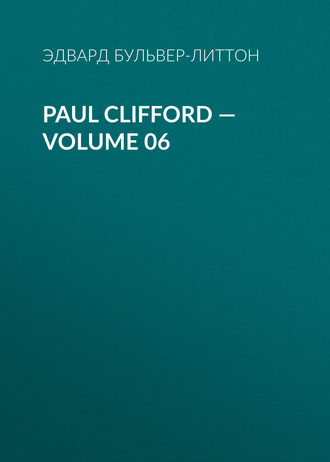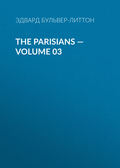
Эдвард Бульвер-Литтон
Paul Clifford — Volume 06
"A light for you," said Tomlinson, profanely, as he reluctantly left his couch, "will indeed be a 'light to lighten the Gentiles!'"
"Why, Mac, Mac!" shouted Ned, "why don't you answer? faith, I think the
Scot's dead!"
"Seize your men!—Yield, sirs!" cried a stern, sudden voice from the gloom; and at that instant two dark lanterns were turned, and their light streamed full upon the astounded forms of Tomlinson and his gaunt comrade! In the dark shade of the background four or five forms were also indistinctly visible; and the ray of the lanterns glimmered on the blades of cutlasses and the barrels of weapons still less easily resisted.
Tomlinson was the first to recover his self-possession. The light just gleamed upon the first step of the stairs leading to the stables, leaving the rest in shadow. He made one stride to the place beside the cart, where, we have said, lay some of the robbers' weapons; he had been anticipated,—the weapons were gone. The next moment Tomlinson had sprung up the steps.
"Lovett! Lovett! Lovett!" shouted he.
The captain, who had followed his comrades into the cavern, was already in the grasp of two men. From few ordinary mortals, however, could any two be selected as fearful odds against such a man as Clifford,—a man in whom a much larger share of sinews and muscle than is usually the lot even of the strong had been hardened, by perpetual exercise, into a consistency and iron firmness which linked power and activity into a union scarcely less remarkable than that immortalized in the glorious beauty of the sculptured gladiator. His right hand is upon the throat of one assailant; his left locks, as in a vice, the wrist of the other; you have scarcely time to breathe! The former is on the ground, the pistol of the latter is wrenched from his grip, Clifford is on the step; a ball —another—whizzes by him; he is by the side of the faithful Augustus!
"Open the secret door!" whispered Clifford to his friend; "I will draw up the steps alone."
Scarcely had he spoken, before the steps were already, but slowly, ascending beneath the desperate strength of the robber. Meanwhile Ned was struggling, as he best might, with two sturdy officers, who appeared loath to use their weapons without an absolute necessity, and who endeavoured, by main strength, to capture and detain their antagonist.
"Look well to the door!" cried the voice of the principal officer, "and hang out more light!"
Two or three additional lanterns were speedily brought forward; and over the whole interior of the cavern a dim but sufficient light now rapidly circled, giving to the scene and to the combatants a picturesque and wild appearance.
The quick eye of the head-officer descried in an instant the rise of the steps, and the advantage the robbers were thereby acquiring. He and two of his men threw themselves forward, seized the ladder, if so it may be called, dragged it once more to the ground, and ascended. But Clifford, grasping with both hands the broken shaft of a cart that lay in reach, received the foremost invader with a salute that sent him prostrate and senseless back among his companions. The second shared the same fate; and the stout leader of the enemy, who, like a true general, had kept himself in the rear, paused now in the middle of the steps, dismayed alike by the reception of his friends and the athletic form towering above, with raised weapons and menacing attitude. Perhaps that moment seemed to the judicious Mr. Nabbem more favourable to parley than to conflict. He cleared his throat, and thus addressed the foe:
"You, sir, Captain Lovett, alias Howard, alias Jackson, alias Cavendish, alias Solomons, alias Devil,—for I knows you well, and could swear to you with half an eye, in your clothes or without,—you lay down your club there, and let me come alongside of you, and you'll find me as gentle as a lamb; for I've been used to gemmen all my life, and I knows how to treat 'em when I has 'em!"
"But if I will not let you 'come alongside of me,' what then?"
"Why, I must send one of these here pops through your skull, that's all!"
"Nay, Mr. Nabbem, that would be too cruel! You surely would not harm one who has such an esteem for you? Don't you remember the manner in which I brought you off from Justice Burnflat, when you were accused, you know whether justly or—"
"You're a liar, Captain!" cried Nabbem, furiously, fearful that something not meet for the ears of his companions should transpire. "You knows you are! Come down, or let me mount; otherwise I won't be 'sponsible for the consequences!"
Clifford cast a look over his shoulder. A gleam of the gray daylight already glimmered through a chink in the secret door, which Tomlinson had now unbarred and was about to open.
"Listen to me, Mr. Nabbem," said he, "and perhaps I may grant what you require! What would you do with me if you had me?"
"You speaks like a sensible man now," answered Nabbem; "and that's after my own heart. Why, you sees, Captain, your time is come, and you can't shilly-shally any longer. You have had your full swing; your years are up, and you must die like a man! But I gives you my honour as a gemman, that if you surrenders, I'll take you to the justice folks as tenderly as if you were made of cotton."
"Give way one moment," said Clifford, "that I may plant the steps firmer for you."
Nabbem retreated to the ground; and Clifford, who had, good-naturedly enough, been unwilling unnecessarily to damage so valuable a functionary, lost not the opportunity now afforded him. Down thundered the steps, clattering heavily among the other officers, and falling like an avalanche on the shoulder of one of the arresters of Long Ned.
Meanwhile Clifford sprang after Tomlinson through the aperture, and found himself—in the presence of four officers, conducted by the shrewd MacGrawler. A blow from a bludgeon on the right cheek and temple of Augustus felled that hero. But Clifford bounded over his comrade's body, dodged from the stroke aimed at himself, caught the blow aimed by another assailant in his open hand, wrested the bludgeon from the officer, struck him to the ground with his own weapon, and darting onward through the labyrinth of the wood, commenced his escape with a step too fleet to allow the hope of a successful pursuit.
CHAPTER XXIX
"In short, Isabella, I offer you myself!"
"Heavens!" cried Isabella, "what do I hear? You, my lord?"
Castle of Otranto.
A novel is like a weatherglass,—where the man appears out at one time, the woman at another. Variable as the atmosphere, the changes of our story now re-present Lucy to the reader.
That charming young person—who, it may be remarked, is (her father excepted) the only unsophisticated and unsullied character in the pages of a story in some measure designed to show, in the depravities of character, the depravities of that social state wherein characters are formed—was sitting alone in her apartment at the period in which we return to her. As time, and that innate and insensible fund of healing, which Nature has placed in the bosoms of the young in order that her great law, the passing away of the old, may not leave too lasting and keen a wound, had softened her first anguish at her father's death, the remembrance of Clifford again resumed its ancient sway in her heart. The loneliness of her life, the absence of amusement, even the sensitiveness and languor which succeed to grief, conspired to invest the image of her lover in a tenderer and more impressive guise. She recalled his words, his actions, his letters, and employed herself whole hours, whole days and nights, in endeavouring to decipher their mystery. Who that has been loved will not acknowledge the singular and mighty force with which a girl, innocent herself, clings to the belief of innocence in her lover? In breasts young and unacquainted with the world, there is so pure a credulity in the existence of unmixed good, so firm a reluctance to think that where we love there can be that which we would not esteem, or where we admire there can be that which we ought to blame, that one may almost deem it an argument in favour of our natural power to attain a greater eminence in virtue than the habits and arts of the existing world will allow us to reach. Perhaps it is not paradoxical to say that we could scarcely believe perfection in others, were not the germ of perfectibility in our own minds! When a man has lived some years among the actual contests of faction without imbibing the prejudice as well as the experience, how wonderingly be smiles at his worship of former idols, how different a colour does history wear to him, how cautious is he now to praise, how slow to admire, how prone to cavil! Human nature has become the human nature of art; and he estimates it not from what it may be, but from what, in the corruptions of a semi-civilization, it is! But in the same manner as the young student clings to the belief that the sage or the minstrel, who has enlightened his reason or chained his imagination, is in character as in genius elevated above the ordinary herd, free from the passions, the frivolities, the little meannesses, and the darkening vices which ordinary flesh is heir to, does a woman who loves for the first time cling to the imagined excellence of him she loves. When Evelina is so shocked at the idea of an occasional fit of intoxication in her "noble, her unrivalled" lover, who does not acknowledge how natural were her feelings? Had Evelina been married six years, and the same lover, then her husband, been really guilty of what she suspected, who does not feel that it would have been very unnatural to have been shocked in the least at the occurrence? She would not have loved him less, nor admired him less, nor would he have been less "the noble and the unrivalled,"—he would have taken his glass too much, have joked the next morning on the event, and the gentle Evelina would have made him a cup of tea; but that which would have been a matter of pleasantry in the husband would have been matter of damnation in a lover. But to return to Lucy.
If it be so hard, so repellent, to believe a lover guilty even of a trivial error, we may readily suppose that Lucy never for a moment admitted the supposition that Clifford had been really guilty of gross error or wilful crime. True that expressions in his letter were more than suspicious; but there is always a charm in the candour of self- condemnation. As it is difficult to believe the excellence of those who praise themselves, so it is difficult to fancy those criminal who condemn. What, too, is the process of a woman's reasoning? Alas! she is too credulous a physiognomist. The turn of a throat, with her, is the unerring token of nobleness of mind; and no one can be guilty of a sin who is blessed with a beautiful forehead! How fondly, how fanatically Lucy loved! She had gathered together a precious and secret hoard,— a glove, a pen, a book, a withered rose-leaf,—treasures rendered inestimable because he had touched them; but more than all, had she the series of his letters,—from the first formal note written to her father, meant for her, in which he answered an invitation, and requested Miss Brandon's acceptance of the music she had wished to have, to the last wild and, to her, inexplicable letter in which he had resigned her forever. On these relics her eyes fed for hours; and as she pored over them, and over thoughts too deep not only for tears but for all utterance or conveyance, you might have almost literally watched the fading of her rich cheek and the pining away of her rounded and elastic form.
It was just in such a mood that she was buried when her uncle knocked at her door for admittance. She hurried away her treasures, and hastened to admit and greet him.
"I have come," said he, smiling, "to beg the pleasure of your company for an old friend who dines with us to-day. But, stay, Lucy, your hair is ill-arranged. Do not let me disturb so important an occupation as your toilette; dress yourself, my love, and join us."
Lucy turned, with a suppressed sigh, to the glass. The uncle lingered for a few moments, surveying her with mingled pride and doubt; he then slowly left the chamber.
Lucy soon afterwards descended to the drawing-room, and beheld with a little surprise (for she had not had sufficient curiosity to inquire the name of the guest), the slender form and comely features of Lord Mauleverer. The earl approached with the same grace which had in his earlier youth rendered him almost irresistible, but which now, from the contrast of years with manner, contained a slight mixture of the comic. He paid his compliments, and in paying them declared that he must leave it to his friend, Sir William, to explain all the danger he had dared, for the sake of satisfying himself that Miss Brandon was no less lovely than when he had last beheld her.
"Yes, indeed," said Brandon, with a scarcely perceptible sneer, "Lord Mauleverer has literally endured the moving accidents of flood and field,—for he was nearly exterminated by a highwayman, and all but drowned in a ditch!"
"Commend me to a friend for setting one off to the best advantage," said Mauleverer, gayly. "Instead of attracting your sympathy, you see, Brandon would expose me to your ridicule; judge for yourself whether I deserve it!" and Mauleverer proceeded to give, with all the animation which belonged to his character, the particulars of that adventure with which the reader is so well acquainted. He did not, we may be sure, feel any scruple in representing himself and his prowess in the most favourable colours.
The story was scarcely ended when dinner was announced. During that meal Mauleverer exerted himself to be amiable with infinite address. Suiting his conversation, more than he had hitherto deigned to do, to the temper of Lucy, and more anxious to soften than to dazzle, he certainly never before appeared to her so attractive. We are bound to add that the point of attraction did not reach beyond the confession that he was a very agreeable old man.
Perhaps, if there had not been a certain half-melancholy vein in his conversation, possibly less uncongenial to his lordship from the remembrance of his lost diamonds, and the impression that Sir William Brandon's cook was considerably worse than his own, he might not have been so successful in pleasing Lucy. As for himself, all the previous impressions she had made on him returned in colours yet more vivid; even the delicate and subdued cast of beauty which had succeeded to her earlier brilliancy, was far more charming to his fastidious and courtly taste than her former glow of spirits and health. He felt himself very much in love during dinner; and after it was over, and Lucy had retired, he told Brandon, with a passionate air, that he adored his niece to distraction!
The wily judge affected to receive the intimation with indifference; but knowing that too long an absence is injurious to a grande passion, he did not keep Mauleverer very late over his wine.
The earl returned rapturously to the drawing-room, and besought Lucy, in a voice in which affectation seemed swooning with delight, to indulge him with a song. More and more enchanted by her assent, he drew the music- stool to the harpsichord, placed a chair beside her, and presently appeared lost in transport. Meanwhile Brandon, with his back to the pair, covered his face with his handkerchief, and to all appearance yielded to the voluptuousness of an after-dinner repose.
Lucy's song-book opened accidentally at a song which had been praised by Clifford; and as she sang, her voice took a richer and more tender tone than in Mauleverer's presence it had ever before assumed.
THE COMPLAINT OF THE VIOLETS WHICH LOSE THEIR SCENT IN MAY
In the shadow that falls from the silent hill
We slept, in our green retreats
And the April showers were wont to fill
Our hearts with sweets.
And though we lay in a lowly bower,
Yet all things loved us well,
And the waking bee left her fairest flower,
With us to dwell.
But the warm May came in his pride to woo
The wealth of our honeyed store;
And our hearts just felt his breath, and knew
Their sweets no more!
And the summer reigns on the quiet spot
Where we dwell, and its suns and showers
Bring balm to our sisters' hearts, but not—
Ah! not to ours.
We live, we bloom, but forever o'er
Is the charm of the earth and sky;
To our life, ye heavens, that balm restore,
Or—bid us die!
As with eyes suffused with many recollections, and a voice which melted away in an indescribable and thrilling pathos, Lucy ceased her song, Mauleverer, charmed out of himself, gently took her hand, and holding the soft treasure in his own, scarcely less soft, he murmured,—
"Angel, sing on! Life would be like your own music, if I could breathe it away at your feet!"
There had been a time when Lucy would have laughed outright at this declaration; and even as it was, a suppressed and half-arch smile played in the dimples of her beautiful mouth, and bewitchingly contrasted the swimming softness of her eyes.
Drawing rather an erroneous omen from the smile, Mauleverer rapturously continued, still detaining the hand which Lucy endeavoured to extricate,—
"Yes, enchanting Miss Brandon! I, who have for so many years boasted of my invulnerable heart, am subdued at last. I have long, very long, struggled against my attachment to you. Alas! it is in vain; and you behold me now utterly at your mercy. Make me the most miserable of men or the most enviable. Enchantress, speak!"
"Really, my lord," said Lucy, hesitating, yet rising, and freeing herself from his hand, "I feel it difficult to suppose you serious; and perhaps this is merely a gallantry to me by way of practice on others."
"Sweet Lucy, if I may so call you," answered Mauleverer, with an ardent gaze, "do not, I implore you, even for a moment, affect to mistake me! Do not for a moment jest at what, to me, is the bane or bliss of life! Dare I hope that my hand and heart, which I now offer you, are not deserving of your derision?"
Lucy gazed on her adorer with a look of serious inquiry; Brandon still appeared to sleep.
"If you are in earnest, my lord," said Lucy, after a pause, "I am truly and deeply sorry. For the friend of my uncle I shall always have esteem; believe that I am truly sensible of the honour you render me, when I add my regret that I can have no other sentiment than esteem."
A blank and puzzled bewilderment for a moment clouded the expressive features of Mauleverer; it passed away. "How sweet is your rebuke!" said he. "Yes; I do not yet deserve any other sentiment than esteem. You are not to be won precipitately; a long trial, a long course of attentions, a long knowledge of my devoted and ardent love, alone will entitle me to hope for a warmer feeling in your breast. Fix then your own time of courtship, angelic Lucy!—-a week, nay, a month! Till then, I will not even press you to appoint that day which to me will be the whitest of my life!"
"My lord!" said Lucy, smiling now no longer half archly, "you must pardon me for believing your proposal can be nothing but a jest; but here, I beseech you, let it rest forever. Do not mention this subject to me again."
"By heavens!" cried Mauleverer, "this is too cruel. Brandon, intercede with me for your niece."
Sir William started, naturally enough, from his slumber, and Mauleverer continued,
"Yes, intercede for me; you, my oldest friend, be my greatest benefactor! I sue to your niece; she affects to disbelieve. Will you convince her of my truth, my devotion, my worship?"
"Disbelieve you!" said the bland judge, with the same secret sneer that usually lurked in the corners of his mouth. "I do not wonder that she is slow to credit the honour you have done her, and for which the noblest damsels in England have sighed in vain. Lucy, will you be cruel to Lord Mauleverer? Believe me, he has often confided to me his love for you; and if the experience of some years avails, there is not a question of his honour and his truth. I leave his fate in your hands."
Brandon turned to the door.
"Stay, dear sir," said Lucy, "and instead of interceding for Lord Mauleverer, intercede for me." Her look now settled into a calm and decided seriousness of expression. "I feel highly flattered by his lordship's proposal, which, as you say, I might well doubt to be gravely meant. I wish him all happiness with a lady of higher deserts; but I speak from an unalterable determination, when I say that I can never accept the dignity with which he would invest me."
So saying, Lucy walked quickly to the door and vanished, leaving the two friends to comment as they would upon her conduct.
"You have spoiled all with your precipitation," said the uncle.
"Precipitation! d—-n it, what would you have? I have been fifty years making up my mind to marry; and now when I have not a day to lose, you talk of precipitation!" answered the lover, throwing himself into an easy-chair.
"But you have not been fifty years making up your mind to marry my niece," said Brandon, dryly.
"To be refused, positively refused, by a country girl!" continued Mauleverer, soliloquizing aloud; "and that too at my age and with all my experience!—a country girl without rank, ton, accomplishments! By heavens! I don't care if all the world heard it,—for not a soul in the world will ever believe it."
Brandon sat speechless, eying the mortified face of the courtier with a malicious complacency, and there was a pause of several minutes. Sir William then, mastering the strange feeling which made him always rejoice in whatever threw ridicule on his friend, approached, laid his hand kindly on Mauleverer's shoulder, and talked to him of comfort and of encouragement. The reader will believe that Mauleverer was not a man whom it was impossible to encourage.







